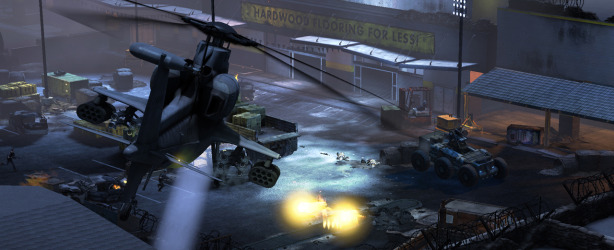
Deus Ex: Human Revolution
Publisher: Square EnixPlatforms: PC, Xbox 360, PS3
Release Date: TBA 2011
Let’s not mince words. If we could only play one game this year, then it would be Square Enix’ long-awaited prequel to what is, in our opinion, one of the best games ever made – Deus Ex.
Set 25 years before the original game, Human Revolution explores themes of transhumanism and what it means to be human against a cyber-punk, neo-noir background that’s heavily influenced by Baroque architecture and fashion. It also has giant robots, and guys with guns hidden in their arms, as well as people who can jump over buildings.
The central feature that binds these plot points together is the idea of human augmentation – or adding robotic bits on to people, if you want to cull the tech-talk completely. After being horribly disfigured in the line of duty, security man Adam Jensen is effectively rebuilt by Sarif Industries; a leading player in the field of augmentation. Emerging from the operating theatre essentially as a living weapon, Adam inevitably becomes a pawn for various secret societies and organisations.
Adam’s augmentations naturally turn up in the gameplay too, providing him with a vast number of special abilities that let him approach missions in a variety of ways. Just as with the original Deus Ex, players can choose how they want to approach problems – do you want to kill the security guard or avoid him? Storm in through the front door, skulk in the air ducts or hack the systems to do the hard work for you? Transhumanism and deeper themes aside, these are the questions that should make Human Revolution a game worth watching and, hopefully, worth playing.
Homefront
Publisher: THQPlatforms: PC, Xbox 360, PS3
Release Date: March 8, 2011
We’ve not had a chance to see Homefront again since we first saw it demonstrated in Germany last year. However, the fact that it’s still on our minds now should tell you how much it impressed us back then. It might be easy to disregard it as nothing but THQ’s take on Call of Duty, but we think it will go a lot deeper than that.
Based around a Korean invasion of America, what we like about Homefront is that the game doesn’t actually start until the war is already over. You aren’t a soldier in the front lines, pushing the foreigners back and thumping your chest as you go; you’re an average citizen who signs up with the resistance. Homefront is a game of guerrilla tactics and small skirmishes in the suburbs, not huge tanks and downtown battlefields.
We’re pleased to see that Homefront’s developer, Kaos Studios, isn't afraid to go back to basics either. While other developers are ranting on about emergent gameplay and wide open spaces, Kaos is content with crafting tight and incredibly cinematic missions – perfecting its walk before it runs, in other words. It remains to be seen whether Kaos’ focus on scripted sequences and a high-speed story (penned by Apocalypse Now’s John Milius, no less) will pay off as well as it has for some other games, however.
It’s also interesting to note that, while the singleplayer game is all about small battles and scrounging weapons, the multiplayer is an almost entirely different story, involving large-scale vehicle combat. There’s an in-game currency that enables players to unlock more weapons and vehicles too, but we won’t let that put us off. Yet.
What games are you looking forward to this year? Let us know in the forums.

MSI MPG Velox 100R Chassis Review
October 14 2021 | 15:04











Want to comment? Please log in.